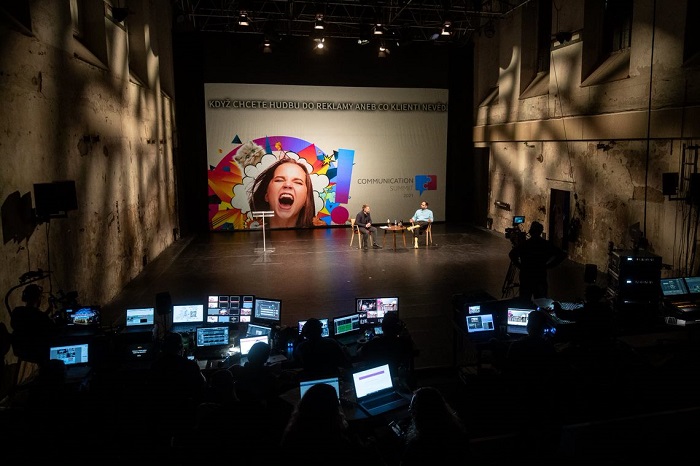 The Communication Summit conference took place in the Jatka 78 theatre this year, source: Blue Events
The Communication Summit conference took place in the Jatka 78 theatre this year, source: Blue EventsEmotions and creativity form the basic premise for ads to make their presence felt in a crowded environment. Stronger emotions are successfully evoked in advertising, according to extensive global research by Kantar, which the agency has documented in the growing spontaneous emotional response over the past seven years. Moreover, during the covid-19 pandemic, the research confirmed that humorous ads worked as successfully as they did in the pre-pandemic period, said Věra Šídlová, global brand manager at Kantar CZ, at this year's Communication Summit conference.
The agency determined the success rate based on the facial recognition method. However, in recent years, advertisements have evoked more negative than positive emotions. As the comparison below shows, in a global perspective, ads that evoked a "frown" from respondents have prevailed over the last five years. In the Czech Republic, the story was slightly different, with positive and negative emotions evoked by advertising alternating over the years. Compared to last year, smiling is becoming more prevalent than frowning this year. According to Věra Šídlová, the examples of various advertisements that evoked positive emotions generally showed that they were based on understanding and comprehension of consumers' needs.
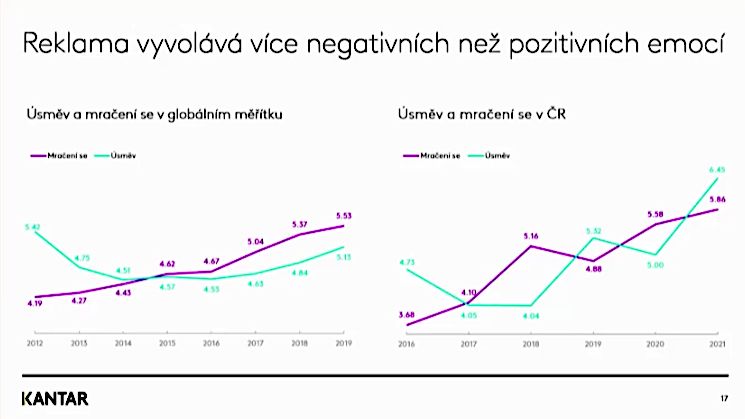 Negative and positive emotions evoked by advertising abroad (left) and in the Czech Republic (right), source: Kantar
Negative and positive emotions evoked by advertising abroad (left) and in the Czech Republic (right), source: KantarAttention, emotion and memory
A model that helps to incorporate emotions into advertising was presented at the conference by Sorin Patilinet from Mars Wrigley. The company he represents is a major advertiser to the media and also uses neuromarketing insights to identify consumer emotions. Yet the starting point for brands is not the best: consumers are attacked by thousands of ads every day, media behaviour is changing and fragmenting, and consumer attention spans are declining. In his experience, the key to success lies in building "specific memory structures". These include gaining attention, building emotions, consistency in creating brand attributes and recalling them in the purchase phase. The process can be described in three phases:
- It needs to be gained right at the beginning of the spot. If this is not done, the likelihood that said spot will not have a good impact on sales increases. This is evidenced by Mars' experience with M&M's campaigns (see chart below)
- The aim is to evoke positive emotions first and foremost. Marketers at Mars believe that positive emotions are more important than negative emotions. An example of this are spots where the viewer's (consumer's) enjoyment of the message gradually increases and the brand logo appears when enjoyment is the highest (see chart below)
- Viewers should find the story as easy to navigate as possible. At the end of the spot, for example, it is not appropriate to confuse their attention by having two or more pieces of product appear. "We know that in this case, consumers are not looking at either one, they are looking somewhere in the middle," Patinilet described.
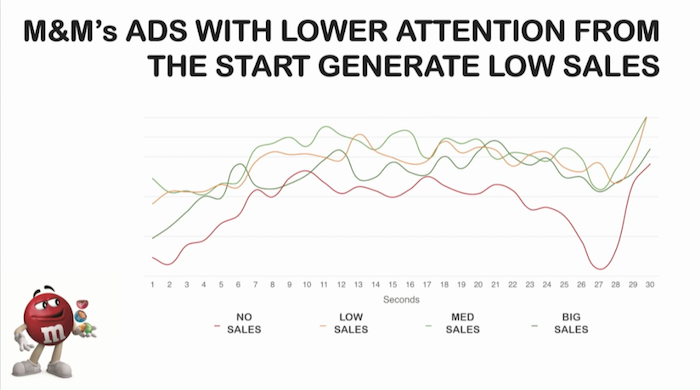 M&M's ads that showed lower levels of consumer attention at the beginning of the spot also had lower sales, source: presentation by S. Patilinet
M&M's ads that showed lower levels of consumer attention at the beginning of the spot also had lower sales, source: presentation by S. Patilinet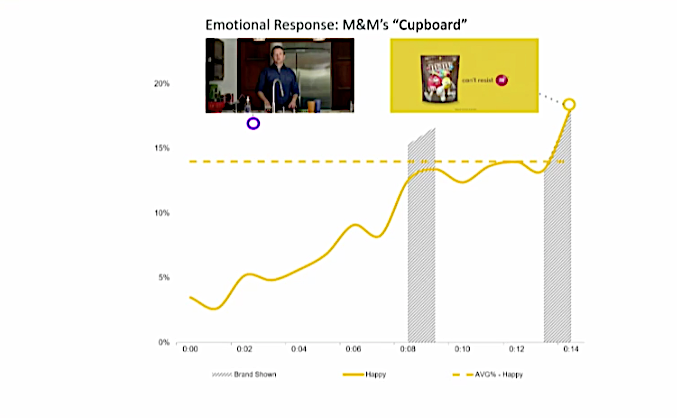
Mars has long invested in technology that measures the sales impact of each campaign. Given the high number of ads it produces, it can benchmark their success rates. It tests roughly three thousand messages, and it also uses neuroscience techniques (biorhythm measurement, EEG and facial recognition) in its tests.
Alzák is changing, Dáme jídlo works with music
Representatives of Czech brands, who gathered in a joint discussion, agreed that they see the benefits of positive emotions for the brand and intend to develop them. Alza.cz is working on transforming its main advertising character Alzák. They are trying to make him more relatable to people and want him to be perceived positively. Research reportedly shows that the character is not pleasing to everyone. The company has been changing the concept of its ads since last Christmas. "We definitely want to keep Alzák, we know he's family gold. But he should get closer to consumers. He has a valuable humour and you can build emotions quickly on humour," said Monika Jančová, marketing division manager at Alza.cz. The shift of the main advertising character is also related to the fact that Alza's target group has gradually expanded since its formation and reaches wider layers of Czech society.
Břetislav Stromko, marketing director of Dáme jídlo.cz, underlined the importance of emotions for the category in which Dáme jídlo operates. "Food is about emotions, it's love, we try to get emotions into marketing and advertising. Loyalty is important to us, and we build it through music as well. We want people to recognise us by our music as well and associate positive emotions with our brand," he said.
Martin Peška from the agency Marketup also mentioned the importance of formats in building a desired outcome. For example, short video formats, so-called bumper ads, can work well to build brand awareness, but are already more difficult to change popularity. "That's the advantage of longer videos, which are twice as expensive but three times as effective," he said.
Captain Demo: Brands must not be afraid
Jiří Burian, musician and producer of Captain Demo, talked about how to create music for commercials that will be successful. "A client or a brand must not be afraid to do something different, to be original and bold and not be too concerned about what people will say or that it will lose some numbers," Burian said at the beginning, adding that besides courage and originality, it is also necessary to have a good team of people around you.
When asked what kind of advertising he considers quality, he replied that he likes Hornbach and Airbank ads. "I am a fan of Hornbach in general, it is an absolute masterpiece for me. They are not afraid and you remember it. There's something right between the chair and the keyboard," he added.
He sees his Captain Demo project as an unusual product where they make fun of many things and often exaggerate. They use replacement extensively in the clips and over-emphasize it. He has worked with Coca-Cola, Mercedes, Zippo and Penny, to name a few. "Normally, the clips would be overly branded, but we make it fun," he says, describing the approach of putting all the partners' logos on the costumes.
Spot of the I Shop Domestic campaign, source: Slovak State Savings Bank
Slovak State Savings Bank has created a movement
Dáša Juríková, director of marketing at Slovak State Savings Bank, described a movement to encourage people to buy Slovak products, which eventually became a campaign. Based on analyses, they found that more than €2.4 billion a year goes abroad for purchases. Therefore, they decided to promote the sale of Slovak products during the pandemic and boost domestic consumption.
They also approached other companies and launched the “I Shop Domestic" initiative last November. In the first phase, about 60 companies joined, but eventually there were more than 1 500. Any company or brand that employs people in Slovakia and pays taxes there could join. In the first phase of the campaign, they tried to recruit as many brands as possible so that as many people as possible would know about the activity.
In their communication, they used the media power not only of themselves but also of their partners and launched the campaign across all media. "Companies and entrepreneurs took to it with vigour, using a range of channels, with extra support materials from us," Juríková added. The initiative became the most frequently mentioned activity related to supporting the Slovak economy. Subsequent research showed that it motivated more than 57% of respondents to buy goods in Slovakia. Moreover, the movement continues, with 90% of signatories wanting to continue to cooperate and the savings bank using the channel to promote vaccinations, for example, which it presents as an opportunity for economic development.
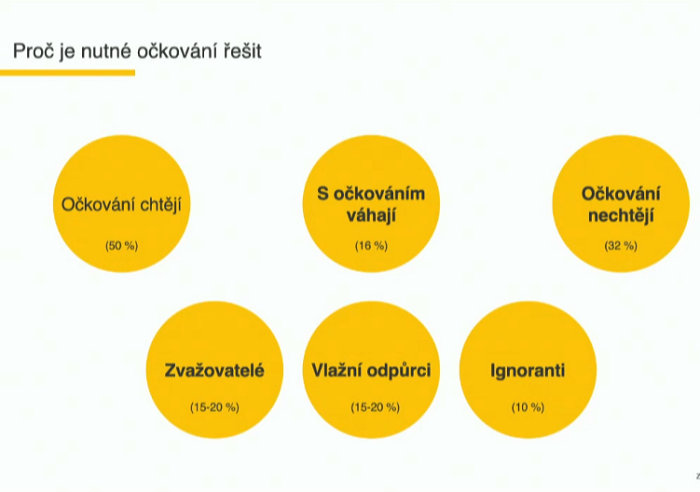 Only 50 % of the Czech population wants to be vaccinated, source: presentation by E. Piňos
Only 50 % of the Czech population wants to be vaccinated, source: presentation by E. PiňosEmotions are not enough for vaccination, practical advice is also needed
Eduard Piňos, a founding member of the Way Out initiative, spoke about the campaign to promote vaccination, in which several entities have come together to support the desire of Czechs to be vaccinated. The preparation was preceded by research to find out what opinions resonate in society. The basic problem turned out to be that people are tired and don't care. There was also a lack of answers to fundamental questions about sufficient testing of vaccines or side effects after vaccination.
"That's why we came to the conclusion that the campaign must convey clear information and be positive," Piños said. The spots are created gradually and respond to current situation. Apart from emotion and rationality, the practical component plays an important role, so that people know where to go or who to contact. Real people and experts appear in most of the 'Let's put a stop to coronavirus' spots.
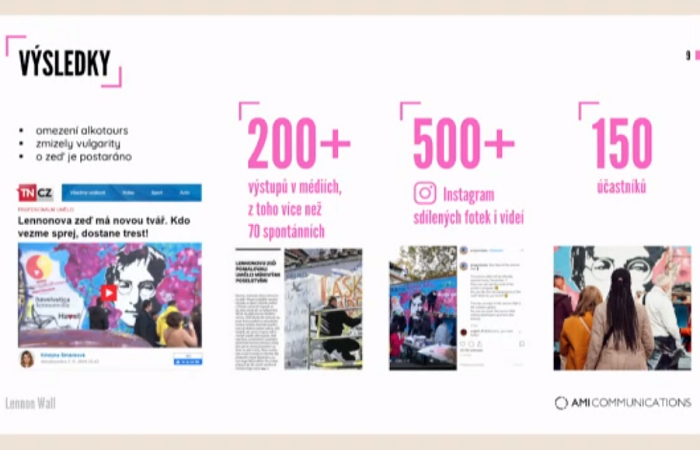 The campaign succeeded in attracting media interest, eventually over 200 outputs were registered, source: presentation by J. Kučmáš
The campaign succeeded in attracting media interest, eventually over 200 outputs were registered, source: presentation by J. KučmášSaving Lennon's Wall
Jan Kučmáš, a partner at Ami Communications, described the action to save Lennon's wall on Velkopřevorské náměstí in Prague's Kampa district. The agency was approached in 2019 by the Order of the Knights of Malta asking for help. "They wished to preserve the wall as a tourist attraction but avoid overtourism," said Jan Kučmáš.
The wall, originally a symbol of peace, had gradually turned into a cheap attraction for crowds of tourists who destroyed it in large with spray paint and travel agencies even organised tours to it. The wall was full of vulgarities and was the scene of noisy parties that disturbed the locals.
The agency succeeded in generating media and public interest. In particular, a report by Czech Television and the subsequent happening, which was attended by a number of celebrities, aroused interest. The wall was reconstructed and unveiled in its new form in November 2019. It now functions as an outdoor gallery, which was designed by Czech designer Pavel Št'astný together with more than thirty artists. Spraying is no longer allowed and the wall has been declared a memorial site.
Seznam is growing in visitors, searches and discussions
During the pandemic, traffic to news websites in general has increased. Seznam accounted for 60 % of the increase, with people going not only to its homepage but also to the news websites Seznam Zprávy and Novinky. Clicks to these even leapfrogged the feed on the Seznam homepage during the first months of the pandemic. "At a time when people were scared and the government was communicating the way it was, they were looking for clear and comprehensive information in one place," explained Tomas Búřil, Seznam's commercial director.
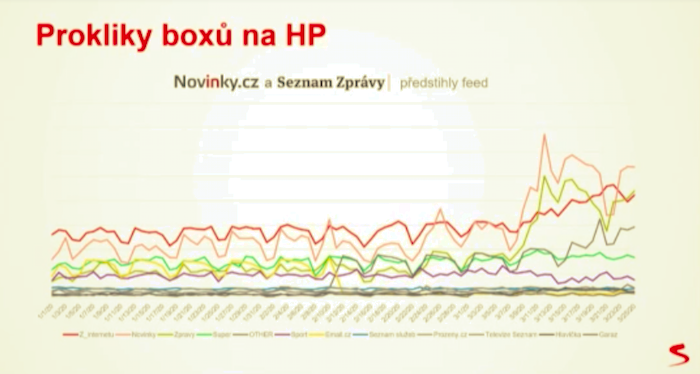 Source: presentation by T. Búřil
Source: presentation by T. BúřilIn addition, people's preferences for videos and articles have changed during the pandemic months. For example, the most watched video was Jan Tuna's "This hormone protects against covid and other diseases. But we are depriving ourselves of it by our own stupidity", which had twice the lead over the video "When a gifted blonde’s horse stampedes, that's when things happen".
Along with visitor traffic, participation in the discussions, which Seznam launched last autumn, grew. At the same time, more discussions are held on Novinky than on Seznam Zpravy. "We explain this by the fact that the discussions on Novinky were deployed earlier, and that their users discuss and insult each other more than on Seznam Zprávy," said Búřil.
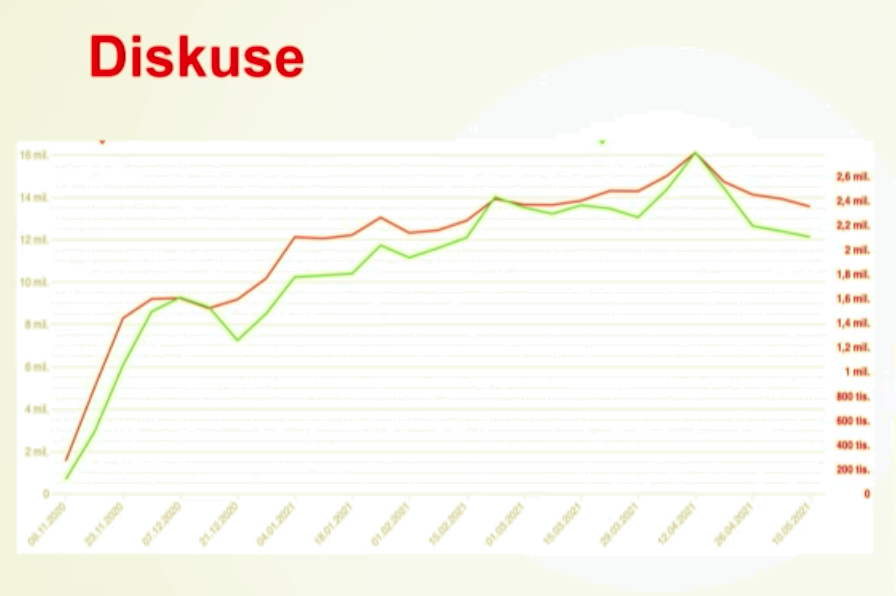 Source: presentation by T. Búřil
Source: presentation by T. BúřilThe average discussion on Seznam's websites contains 5,300 emoticons, with hearts and anger being the most used, while other emotions are not as prominent. The liveliest discussion so far was sparked by an article with the headline "The Castle replied to Eliška Balzerová's letter", which had 8 384 comments and 150 300 emoticons.
Searches have also increased, with peaks recorded before the outbreak of each pandemic wave. The most searched terms were, unsurprisingly, covid 19, vaccination registration, covid, covid tests, covid test sites, covid affidavit, covid symptoms, covid dog, covid traffic light, Basiková covid and covid stores measures. "The growth of mobile phone use has also accelerated. People needed to be more online, so they used mobile phones not only outdoors but also at home, where one computer was suddenly not enough," Buril added.
Mastercard is betting on e-sport
Mastercard, which has been communicating the "Priceless" concept for over 20 years with the slogan: "There are some things money can't buy. Mastercard is here for everything else", is now increasingly focusing on e-sports. Alongside other activities, be it sports, entertainment or culture, it started supporting professional computer gaming on a global level three years ago, in the Czech market last year. "E-sports are mostly played by younger people who are still looking for a banking or card partner," explained Tomáš Doležal, head of marketing and communications at Mastercard for the Czech and Slovak market.
In addition, 70 % of the gaming community is in favour of big brands entering e-sports because it brings prestige. More than half (51 %) would also like to see more brands sponsoring e-sports, while the other half believe that sponsors only sometimes add value to e-sports.
Mastercard is therefore teaming up with League of Legends. In the Czech market, it sponsors the Esuba team, which brought it a reach of 100,000 unique users in the first quarter of this year alone, as well as the MC Hitpoint Masters competition with a reach of 750,000 users, and also works with influencer Xnapy, which has the largest reach in League of Legends in the Czech market - 150,000 users on Twitch and 200,000 on YouTube.
Micro-localization offers an alternative to a single offer
Petr Šimek, CEO of Wellen, discussed the topic of micro-localization in his presentation. He drew on his dissertation, which he has been working on for the last three years.
Micro-localisation responds to specific needs in a given location - an urban district, city or region. On one hand, it responds to globalisation, on the other to personalisation, which many consumers struggle with. "Customers usually don't want to share their personal data in order to receive too specific messages from brands," explains Šimek, adding that they rather appreciate respect for the context of the place. In fact, when marketers and merchants become part of a community, customers are more likely to buy from them.
According to research Šimek conducted as part of his dissertation, 75 % of Czech consumers are interested in what is happening in their region and 58 % participate in regional or local events. Only 23 % are members of a local club or association. Feeling at home when shopping is important to 89 % of respondents, and respect for the store's cultural background is important to 79 %. Nearly 60 % appreciate regional offerings alongside national ones.
Customers would prefer local products both because of their ecological dimension (78.5 %) and social responsibility (56.9 %). Mostly, however, because they know exactly where they come from (83.4 %).
In terms of regions, the Moravian-Silesian, South Moravian and Vysočina regions place the greatest emphasis on localness. Among the cities, it is Písek. "There are customers in the Czech republic who care about micro-localization. They want to be respected, they want to feel the commitment of companies in the region," Šimek summarised and pointed out that the communication of localism must fundamentally come from the region, only then will people be willing to listen to incentives.
When hate surprises you, stand your ground
Some advertising campaigns can ignite a really strong wave of hateful reactions. Even global brands like Nike, Burger King and Gillette have had to deal with it. "Hate spreads fast," warned Leonard Savage of McCann Prague, pointing to the case of Gilette's "We Believe: The Best Men Can Be" ad, which received more than 90 % of negative reactions in the first few days. Over time, however, defenders of the ad began to speak out and the ratio of positive to negative comments evened out.
The mobile operator Vodafone had a similar experience in the Czech Republic with its Christmas advert last year, in which, among others, it cast the Czech-Indonesian Budiman family. In it, a mother with two boys, Sam and Max, lives through the Christmas preparations as a single mother whose husband has died. Many social media users reacted very negatively to the spot. "We anticipated criticism for showing an incomplete family, but not racist comments," revealed Quique Vivas, the company's vice president of non-business customers.
Vodafone decided to react in this situation and, in the words of its CEO Petr Dvorak, rejected the hate speech. Subsequently, single mothers joined the debate and its tonality changed - alongside the negative voices, more positive ones began to be heard. "The important thing is to choose a side and advocate for it, while remaining clear, relevant and meaningful," advised Quique Vivas, adding that it is not enough to just contribute to the topic, but to take it fully on board and commit to it. "If we are against racism, we must double our efforts in this area," Vivas added.
A study on the uniqueness of brands in the Czech market was also presented at the conference. More information can be found in this text.
Source: mediaguru.cz

